Data Access And Re-Use In The European Legal Framework For Data, From The GDPR To The Proposed Data Act: The Case Of Vehicle Data


 In their working paper on “Data Access and Re-Use in the European Legal Framework for Data, from the GDPR to the Proposed Data Act: The Case of Vehicle Data” ESRs Tommaso Crepax, Mitisha Gaur, and Barbara Lazarotto explore the topic of data access and portability of vehicles’ black boxes, which are electronic data recorders that record a vehicle’s speed, breaking, and other information in the event of a crash. The paper centers the analysis on three main stakeholders: consumers, the public sector, and insurance companies, each having a distinct interest in data. It identifies a number of legal enablers and blockers that could affect data access and portability. The topic of this paper is closely related to the individual topics of the ESRs since it covers topics such as data sharing, access, and portability between
In their working paper on “Data Access and Re-Use in the European Legal Framework for Data, from the GDPR to the Proposed Data Act: The Case of Vehicle Data” ESRs Tommaso Crepax, Mitisha Gaur, and Barbara Lazarotto explore the topic of data access and portability of vehicles’ black boxes, which are electronic data recorders that record a vehicle’s speed, breaking, and other information in the event of a crash. The paper centers the analysis on three main stakeholders: consumers, the public sector, and insurance companies, each having a distinct interest in data. It identifies a number of legal enablers and blockers that could affect data access and portability. The topic of this paper is closely related to the individual topics of the ESRs since it covers topics such as data sharing, access, and portability between
different public and private stakeholders, and how this data can be used to feed algorithms that will generate driver’s profiles. Furthermore, it can be considered a case study that explores the topics of Crossroad 1 “Privacy vs Intellectual Property” and of Crossroad 3 “Data Ownership”, analyzing how black box data can be accessed based on privacy regulations and how individuals can take more control of their vehicle data. The tension of Crossroad 1 becomes evident in the case of black box data in the debate over whether individuals have the right to access their own black box data, and whether companies have the right to use that data for commercial purposes. Questions related to data ownership (crossroad 3) are particularly important in the case of black box data because the data can be used to create driver profiles, which could be used for a variety of purposes, such as assessing driver risk and providing personalized safety recommendations.
The paper concludes by providing valuable insights and recommendations for enhancing data access and reuse while improving transparency and accountability in the process. The authors present a methodology for comparing and evaluating the degree of access conferred by various regulations and put it to practical use to assess how much data is currently left out from access by the existing legislation, how much of such data is covered by the Data Act, and ultimately, how much still remains inaccessible for reuse. The proposed framework can deliver on the promises of access and reuse, but there are promising research areas that have not been extensively discussed, including topics such as competition, data governance and markets, and quality of data.
Abstract of the Working Paper
This article delves into the difficulties and opportunities associated with the acquisition, sharing, and re-purposing of vehicle data, particularly information derived from black boxes used by insurance companies and event data recorders installed by manufacturers. While this data is usually utilized by insurers and car makers, the authors contend that consumers, rival firms, and public institutions may also profit from accessing the data for objectives such as data portability between insurance companies, traffic and transportation management, and the development of intelligent mobility solutions. Among other regulations, the authors examine the proposed Data Act as the European chosen champion to address the legal and technical hurdles surrounding the reuse of privately held corporate data, including privacy and intellectual property, competition, and data interoperability issues. The text also offers an overview of the sorts of data obtained through vehicle recording systems and their potential benefits for various stakeholders. The authors present a methodology for comparing and evaluating, in an ordinal fashion, the degree of access conferred by various regulations and put it to practical use to assess how much data is currently left out from access by the existing legislation, how much of such data is covered by the Data Act, and ultimately, how much still remains inaccessible for reuse.
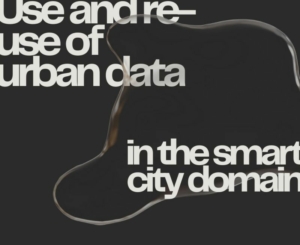 ESR Barbara Lazarotto has contributed to a white paper on the “Use and re-use of urban data in the smart city domain”.
ESR Barbara Lazarotto has contributed to a white paper on the “Use and re-use of urban data in the smart city domain”.



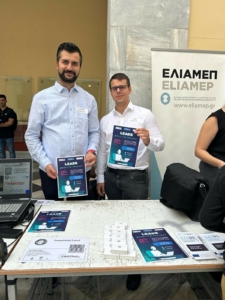 sheets facilitated the conceptualization of these concepts. The majority of visitors expressed interest in AI developments, making the AI Act the central topic of most conversations. High school students were also intrigued by the backgrounds of the ESRs; the diversity of disciplines represented by the three ESRs captured their attention about potential future careers.
sheets facilitated the conceptualization of these concepts. The majority of visitors expressed interest in AI developments, making the AI Act the central topic of most conversations. High school students were also intrigued by the backgrounds of the ESRs; the diversity of disciplines represented by the three ESRs captured their attention about potential future careers.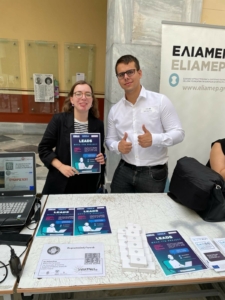 ESRs also had the opportunity to observe the scientific fair, where researchers from various fields presented their projects, proving to be inspiring. The connection with CERN labs stood out as a prominent example. The program provided a valuable chance for ESRs to engage with other researchers.
ESRs also had the opportunity to observe the scientific fair, where researchers from various fields presented their projects, proving to be inspiring. The connection with CERN labs stood out as a prominent example. The program provided a valuable chance for ESRs to engage with other researchers.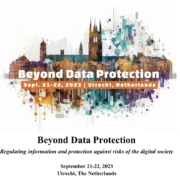
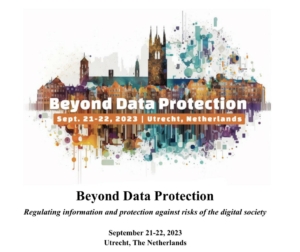 On 21-22nd September 2023, the “
On 21-22nd September 2023, the “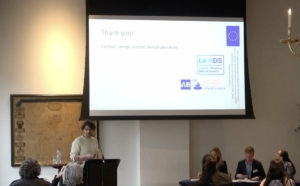 Vantage Point for the Protection of Consumer Data – Protecting or Polluting the Privacy Ecosystem?” in a panel on ‘Beyond Data Protection‘. He elaborated how the regulation of data has increasingly become a regulatory concern for the (market-focussed) European consumer law, despite being anchored in the (fundamental rights-focussed) European data protection framework. Whilst authors have increasingly identified potential complementarities between both fields of law for the protection of consumer data, he argued that they might at times pursue opposite objectives. By drawing parallels with debates that surrounded the uneasy relationship between consumer and environmental policy, Onntje showed how the regulation of consumer data under consumer law potentially not only contributes to the protection but also the pollution of the privacy ecosystem. At the same time, he relied on this analogy to showcase how existing tensions between both policy areas can be overcome.
Vantage Point for the Protection of Consumer Data – Protecting or Polluting the Privacy Ecosystem?” in a panel on ‘Beyond Data Protection‘. He elaborated how the regulation of data has increasingly become a regulatory concern for the (market-focussed) European consumer law, despite being anchored in the (fundamental rights-focussed) European data protection framework. Whilst authors have increasingly identified potential complementarities between both fields of law for the protection of consumer data, he argued that they might at times pursue opposite objectives. By drawing parallels with debates that surrounded the uneasy relationship between consumer and environmental policy, Onntje showed how the regulation of consumer data under consumer law potentially not only contributes to the protection but also the pollution of the privacy ecosystem. At the same time, he relied on this analogy to showcase how existing tensions between both policy areas can be overcome.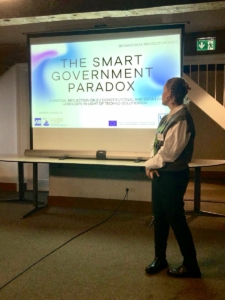 Barbara presented her paper “The Smart Government Paradox: A Critical Reflection on EU Constitutional and Data Law Landscape in Light of Techno-Solutionism” in a panel on Government data and surveillance. She explored how business to government data sharing practices can give governments superpowers which threatens the rights of citizens. She made an analysis of how the creation of multilayered data access rights in the public sector can give citizens tools to fight against smart government abuses.
Barbara presented her paper “The Smart Government Paradox: A Critical Reflection on EU Constitutional and Data Law Landscape in Light of Techno-Solutionism” in a panel on Government data and surveillance. She explored how business to government data sharing practices can give governments superpowers which threatens the rights of citizens. She made an analysis of how the creation of multilayered data access rights in the public sector can give citizens tools to fight against smart government abuses.
 Mitisha Gaur, ESR with the LeADS Project, recently presented at
Mitisha Gaur, ESR with the LeADS Project, recently presented at 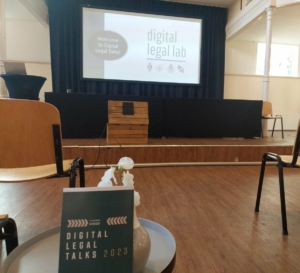 The presentation delved into an analysis of the human oversight requirements while detailing the material gaps in the human oversight strategy adopted by the draft AI Act. Finally, a specific plan focused on ensuring human oversight across 4 primary stakeholders namely (1) Developers of AI systems; (2) Deployers of AI Systems; (3) Users of the AI System and; (4) the Impact Population on whom the computational results of the AI system are applied was shared.
The presentation delved into an analysis of the human oversight requirements while detailing the material gaps in the human oversight strategy adopted by the draft AI Act. Finally, a specific plan focused on ensuring human oversight across 4 primary stakeholders namely (1) Developers of AI systems; (2) Deployers of AI Systems; (3) Users of the AI System and; (4) the Impact Population on whom the computational results of the AI system are applied was shared.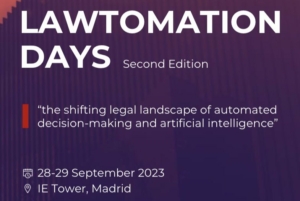 Subsequently on the 29th of September, Mitisha also presented her work at the
Subsequently on the 29th of September, Mitisha also presented her work at the 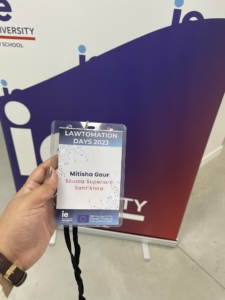



 Maciej Zuziak (ESR 6), Onntje Hinrichs (ESR 13), and Aizhan Abdrasulova (ESR 12) are the authors of the paper “Data Collaboratives with the Use of Decentralised Learning – an Interdisciplinary Perspective on Data Governance”. The paper constitutes a collaboration across three different LeADS Crossroads, i. e. Privacy vs Intellectual Property (Onntje) Data ownership (Aizhan) and Empowering Individuals (Maciej) as well as across disciplines: whereas Onntje and Aizhan focused their research on questions related to data ownership and how conflicted interests in data can be resolved, Maciej is examining various methods of distributed learning.
Maciej Zuziak (ESR 6), Onntje Hinrichs (ESR 13), and Aizhan Abdrasulova (ESR 12) are the authors of the paper “Data Collaboratives with the Use of Decentralised Learning – an Interdisciplinary Perspective on Data Governance”. The paper constitutes a collaboration across three different LeADS Crossroads, i. e. Privacy vs Intellectual Property (Onntje) Data ownership (Aizhan) and Empowering Individuals (Maciej) as well as across disciplines: whereas Onntje and Aizhan focused their research on questions related to data ownership and how conflicted interests in data can be resolved, Maciej is examining various methods of distributed learning.


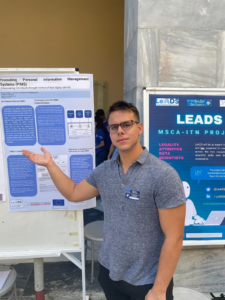 The WoPa titled “From Data Governance by Design to Data Governance as a Service” is a result of collaborative work between three ESRs from the LeADS project, Armend Duzha (ESR10) and Christos Magkos (ESR11) from University of Piraeus Research Centre (UPRC), and Louis Sahi (ESR2) from University of Toulouse III (UT3), under the supervision of Dr Manolis Alexakis from UPRC and Dr Ali Mohamed Kandi from UT3. Hence, it was designed and conceptualized as a multidisciplinary work, spanning from data processing and management to security and privacy-preservation areas. This is directly related to the research topics of the ESR fellows involved, but most importantly the study carried out as part of the Crossroads (ESRs 10 and 11 are part of Crossroad 4 “Empowering Individuals” while ESR 2 is part of Crossroad 2 “Trust”). Specifically, during the second iteration of the Crossroads, a more in-deep analysis of the state of the art and assessment of existing methods were conducted first individually and then shared among the teams.
The WoPa titled “From Data Governance by Design to Data Governance as a Service” is a result of collaborative work between three ESRs from the LeADS project, Armend Duzha (ESR10) and Christos Magkos (ESR11) from University of Piraeus Research Centre (UPRC), and Louis Sahi (ESR2) from University of Toulouse III (UT3), under the supervision of Dr Manolis Alexakis from UPRC and Dr Ali Mohamed Kandi from UT3. Hence, it was designed and conceptualized as a multidisciplinary work, spanning from data processing and management to security and privacy-preservation areas. This is directly related to the research topics of the ESR fellows involved, but most importantly the study carried out as part of the Crossroads (ESRs 10 and 11 are part of Crossroad 4 “Empowering Individuals” while ESR 2 is part of Crossroad 2 “Trust”). Specifically, during the second iteration of the Crossroads, a more in-deep analysis of the state of the art and assessment of existing methods were conducted first individually and then shared among the teams.


 In their working paper on “Data Access and Re-Use in the European Legal Framework for Data, from the GDPR to the Proposed Data Act: The Case of Vehicle Data” ESRs Tommaso Crepax, Mitisha Gaur, and Barbara Lazarotto explore the topic of data access and portability of vehicles’ black boxes, which are electronic data recorders that record a vehicle’s speed, breaking, and other information in the event of a crash. The paper centers the analysis on three main stakeholders: consumers, the public sector, and insurance companies, each having a distinct interest in data. It identifies a number of legal enablers and blockers that could affect data access and portability. The topic of this paper is closely related to the individual topics of the ESRs since it covers topics such as data sharing, access, and portability between
In their working paper on “Data Access and Re-Use in the European Legal Framework for Data, from the GDPR to the Proposed Data Act: The Case of Vehicle Data” ESRs Tommaso Crepax, Mitisha Gaur, and Barbara Lazarotto explore the topic of data access and portability of vehicles’ black boxes, which are electronic data recorders that record a vehicle’s speed, breaking, and other information in the event of a crash. The paper centers the analysis on three main stakeholders: consumers, the public sector, and insurance companies, each having a distinct interest in data. It identifies a number of legal enablers and blockers that could affect data access and portability. The topic of this paper is closely related to the individual topics of the ESRs since it covers topics such as data sharing, access, and portability between

 Xengie Doan and Fatma Dogan participated in the WOPA, ESR 9 and 8 respectively. Xengie is working on collective dynamic consent for genetic data and was interesting in exploring the WOPA topic to better understand the current state of publicly available information from popular direct-to-consumer genetic test companies. Of the information given, how transparent are the data processing activities, the communication about risks and benefits (including collective implications, e.g. risks and benefits also affect family members), and was it framed in a way that enabled potential customers to know their rights? These rights are
Xengie Doan and Fatma Dogan participated in the WOPA, ESR 9 and 8 respectively. Xengie is working on collective dynamic consent for genetic data and was interesting in exploring the WOPA topic to better understand the current state of publicly available information from popular direct-to-consumer genetic test companies. Of the information given, how transparent are the data processing activities, the communication about risks and benefits (including collective implications, e.g. risks and benefits also affect family members), and was it framed in a way that enabled potential customers to know their rights? These rights are


 Robert Lee Poe (ESR 14) and Soumia Zohra El Mestari (ESR 15) authored “Borders Between Unfair Commercial Practices and Discrimination in Using Data.” Robert and Soumia, having initially investigated algorithmic fairness/discrimination in their Crossroad “Trust in Data Processing and Algorithmic Design,” narrowed the WOPA subject matter to an in-depth analysis of particular fair machine learning strategies used in practice for purportedly ensuring non-discrimination/fairness in automated decision-making systems. The intersection of algorithmic unfairness and non-discrimination law is the focal point of Robert’s Ph.D. research, specifically the legality of using fair machine learning techniques in automated decisions from both a European Union and United States legal perspective (hiring, admissions, loan decisions, etc.). Soumia’s Ph.D. research focuses on the
Robert Lee Poe (ESR 14) and Soumia Zohra El Mestari (ESR 15) authored “Borders Between Unfair Commercial Practices and Discrimination in Using Data.” Robert and Soumia, having initially investigated algorithmic fairness/discrimination in their Crossroad “Trust in Data Processing and Algorithmic Design,” narrowed the WOPA subject matter to an in-depth analysis of particular fair machine learning strategies used in practice for purportedly ensuring non-discrimination/fairness in automated decision-making systems. The intersection of algorithmic unfairness and non-discrimination law is the focal point of Robert’s Ph.D. research, specifically the legality of using fair machine learning techniques in automated decisions from both a European Union and United States legal perspective (hiring, admissions, loan decisions, etc.). Soumia’s Ph.D. research focuses on the  implementation of privacy-preserving techniques as constraints to be enforced to achieve trustworthy processing in complex machine learning pipelines, where she also investigates the gap between data protection legislation and trustworthy machine learning implementations, and how the different components of trustworthiness such as privacy, robustness, and fairness interact. The study of the dynamics of these interactions offers a better understanding of how a trustworthy machine learning pipeline should be implemented, exposed as a service, and interpreted under the different legal instruments. The WOPA focuses on studying one type of those interactions namely: the robustness (measured as accuracy) and fairness (measured as group similarity) and how the focus on one of those two components affects the other under different data distributions. The main contribution of the WOPA is the clarity provided by the conceptual and empirical understanding of the trade-off between statistically accurate outcomes (robust) and group similar outcomes (fair). While that distinction is not a legal one, it has many implications for non-discrimination law, and further research in that direction is needed, with specific suggestions being given in the conclusion of the article.
implementation of privacy-preserving techniques as constraints to be enforced to achieve trustworthy processing in complex machine learning pipelines, where she also investigates the gap between data protection legislation and trustworthy machine learning implementations, and how the different components of trustworthiness such as privacy, robustness, and fairness interact. The study of the dynamics of these interactions offers a better understanding of how a trustworthy machine learning pipeline should be implemented, exposed as a service, and interpreted under the different legal instruments. The WOPA focuses on studying one type of those interactions namely: the robustness (measured as accuracy) and fairness (measured as group similarity) and how the focus on one of those two components affects the other under different data distributions. The main contribution of the WOPA is the clarity provided by the conceptual and empirical understanding of the trade-off between statistically accurate outcomes (robust) and group similar outcomes (fair). While that distinction is not a legal one, it has many implications for non-discrimination law, and further research in that direction is needed, with specific suggestions being given in the conclusion of the article.